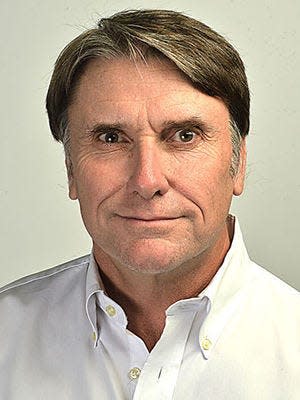Putin is living in the past
Vladimir Putin, a 20th century tyrant fighting a 21st century war, had been hailed in virtually every corner of the globe as a master tactician and brilliant communicator, a technological and cultural eminence for whom no nation in his sphere of influence can be any sort of match.
But after being gobsmacked by Ukraine and the planet at large, it’s becoming apparent that old guys are bad at war, because too much of the world has passed them by.
Maybe he’s been too busy reading his own press clippings, but even basic logistics, the very fundamental building block of war, have failed in most embarrassing ways. In the Civil War we praised our generals, but some of the bigger heroes were the ones responsible for delivering freight cars of hay to hungry warhorses.
By contrast, the infamous Russian convoy that was supposed to crush Kyiv like a bug, couldn’t even feed or fuel itself — a mistake worthy of the 16th century.

And speaking of the past, Putin seems to have fixated on Chechnya, Crimea and Aleppo, sites of Russian barbarism, where he nevertheless controlled the narrative and blunted world criticism.
But in the world of communications, six years is forever. Russia had no idea how crisply and immediately the lines would be drawn. In short, the master of propaganda got out-propagandaed.
No doubt, some of the heroic and optimistic electronic dispatches coming from Ukraine were, and are, false, but that’s hardly the point. Ukraine set the tone and the narrative early, beating Putin to the punch in a war that in some ways is being fought as much with cellphones as artillery.
Putin’s knowledge of technology didn’t seem to account for universally available apps that can allow anyone anywhere to track aircraft or view satellite imagery of the battlefield — an advancement that not only turned the Russian convoy into a laughingstock, but also made sitting ducks of tanks and bolstered Ukrainian morale in the war’s critical early days.
Nor did Putin seem to understand that he and the Chinese weren’t the only people on this planet with hacking skills. This is the way aging autocrats think: The fact that other nations don’t hack must mean they don’t know how.
It would never occur to an autocrat like Putin that morals, law and decency — not a lack of ability — are what keep the civilized countries of this world from hacking into competing governments and corporations.
So when Putin launched his shells, the most immediate effect was the explosion of Russian websites, taken down by those who, until now, had no reason and better manners than to have done so previously.
Putin’s lack of counter-hacking has been a mystery to date. This is still possible and perhaps likely. But the delay might indicate that he has suddenly been made to understand that Russia’s own vulnerabilities are far greater than he thought — and his own techies are now spending their time playing defense.
Perhaps the most foolish thing Putin did was believe the fake news coming from Fox, Facebook and the entire right-wing drumbeat of lies that he himself helped to create. He believed President Joe Biden to be weak, just as Fox told him, a doddering and mentally slipping old man incapable of putting up a fight.
It was assumed Tucker Carlson and Laura Ingraham would make effective spokespeople, that all they needed to do was tell their audiences that Putin was a good guy and American opinion would coalesce around the Russians.
He honestly seems to have believed that he and his American allies had so eroded American civility and resolve that we would react meekly, if at all, to Russian atrocities. But to dismiss the durability of American values, both of the people and the president, was a sloppy mistake.
A decade older than Putin, Biden nevertheless showed the characteristic flexibility that gives democracies an advantage over autocracies. Typically, nations sit on their intelligence like a mother hen; this time, we broadcast to the world everything we knew well in advance, exposing plans for false flag operations and other Russian tricks, knocking the despot off his game early.
And devastatingly, Putin failed to realize that modern technology could make the ruble worthless, almost like flipping a switch. His renowned “economic fortress” crumbled because he bet stacks of gold bars, a great asset in 1830, could protect him against a day when money is more represented by electrons than doubloons.
Of course a cornered savage is a dangerous savage. The world right now could use a little vintage Putin craftiness and doublespeak that will allow him a face-saving exit from the catastrophe of his own creation. But for that to happen he will need to stop living in the past.
Tim Rowland is a Herald-Mail columnist.
This article originally appeared on The Herald-Mail: In Ukraine, it has become clear Vladimir Putin is living in the past
